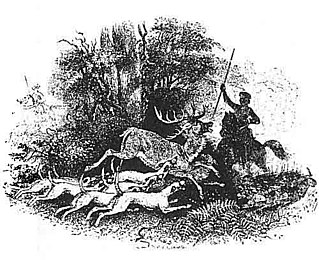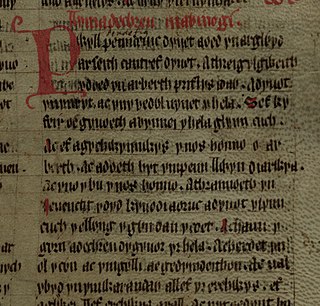Related Research Articles
Manawydan fab Llŷr is a figure of Welsh mythology, the son of Llŷr and the brother of Brân the Blessed and Brânwen. The first element in his name is cognate with the stem of the name of the Irish sea god Manannán mac Lir, and likely originated from the same Celtic deity as Manannán. Unlike Manannán, however, no surviving material connects him with the sea in any way except for his patronymic. Manawydan's most important appearances occur in the Second and Third Branches of the Mabinogi, but he is also referenced frequently in medieval poetry and the Welsh Triads.

Pryderi fab Pwyll is a prominent figure in Welsh mythology, the son of Pwyll and Rhiannon, and king of Dyfed after his father's death. He is the only character to appear in all Four Branches of the Mabinogi, although the size of his role varies from tale to tale. He is often equated with the divine son figure of Mabon ap Modron, while Jeffrey Gantz compares him to Peredur fab Efrawg, who is himself associated with the continental figure of Sir Percival de Galles.
Annwn, Annwfn, or Annwfyn is the Otherworld in Welsh mythology. Ruled by Arawn, it was essentially a world of delights and eternal youth where disease was absent and food was ever-abundant.
In Welsh mythology, Arawn was the king of the otherworld realm of Annwn who appears prominently in the first branch of the Mabinogi, and alluded to in the fourth. In later tradition, the role of the king of Annwn was largely attributed to the Welsh psychopomp, Gwyn ap Nudd - meaning "white" a possible kenning for his true name. However, Arawn's memory is retained in a traditional saying found in an old Cardigan folktale:

Pwyll Pen Annwn is a prominent figure in Welsh mythology and literature, the lord of Dyfed, husband of Rhiannon and father of the hero Pryderi. Meaning ''wisdom" he is the eponymous hero of Pwyll Pendefig Dyfed, the first branch of the Four Branches of the Mabinogi, and also appears briefly as a member of Arthur's court in the medieval tale Culhwch ac Olwen. Pwyll, Prince of Dyfed also carries many similarities to the Mabinogi Branwen.

Rhiannon is a major figure in Welsh mythology, appearing in the First Branch of the Mabinogi, and again in the Third Branch. Ronald Hutton called her "one of the great female personalities in World literature", adding that "there is in fact, nobody quite like her in previous human literature". In the Mabinogi, Rhiannon is a strong-minded Otherworld woman, who chooses Pwyll, prince of Dyfed, as her consort, in preference to another man to whom she has already been betrothed. She is intelligent, politically strategic, beautiful, and famed for her wealth and generosity. With Pwyll she has a son, the hero Pryderi, who later inherits the lordship of Dyfed. She endures tragedy when her newborn child is abducted, and she is accused of infanticide. As a widow she marries Manawydan of the British royal family, and has further adventures involving enchantments.
In Welsh mythology, Gwawl was the son of Clud, and tricks Pwyll into promising him Rhiannon. She decides to marry Pwyll instead. Nothing is known of his father Clud.
In Welsh tradition, Teyrnon Twryf Lliant is the lord of the Kingdom of Gwent and the foster father of the divine son, Pryderi. He appears most prominently in Pwyll Pendefig Dyfed, the first of the Four Branches of the Mabinogi, but also features briefly in the early tale on the Matter of Britain, Culhwch and Olwen, as a knight of King Arthur. The name Teyrnon is widely acknowledged as deriving from the Common Brittonic *tigernonos, "great lord".

Brân the Blessed is a giant and king of Britain in Welsh mythology. He appears in several of the Welsh Triads, but his most significant role is in the Second Branch of the Mabinogi, Branwen ferch Llŷr. He is a son of Llŷr and Penarddun, and the brother of Brânwen, Manawydan, Nisien and Efnysien. The name "Brân" in Welsh is usually translated as crow or raven.
In Welsh mythology and folklore, Cŵn Annwn, singular Ci Annwn, were the spectral hounds of Annwn, the otherworld of Welsh myth. They were associated with a form of the Wild Hunt, presided over by either Arawn, king of Annwn in Pwyll Pendefig Dyfed, the First Branch of the Mabinogi and alluded to in Math fab Mathonwy the Fourth Branch of the Mabinogi, or by Gwyn ap Nudd as the underworld king and king of the fair(y) folk is named in later medieval lore.
Cigfa ferch Gwyn Glohoyw is a minor character in Welsh mythology, the wife of King Pryderi of Dyfed. She is mentioned briefly in the First Branch of the Mabinogi, and appears more prominently in the third. Describing the character, Proinsias Mac Cana writes: "Cigfa strikes one as a slight though effective vignette of a contemporary bourgeois snob while William John Gruffydd hypothesises that the character was a later addition to the tale." John Rhys suggested a connection between Cigfa and the Irish character Ciochba.

The Mabinogion are the earliest Welsh prose stories, and belong to the Matter of Britain. The stories were compiled in Middle Welsh in the 12th–13th centuries from earlier oral traditions. There are two main source manuscripts, created c. 1350–1410, as well as a few earlier fragments. The title covers a collection of eleven prose stories of widely different types, offering drama, philosophy, romance, tragedy, fantasy and humour, and created by various narrators over time. There is a classic hero quest, "Culhwch and Olwen"; a historic legend in "Lludd and Llefelys", complete with glimpses of a far off age; and other tales portray a very different King Arthur from the later popular versions. The highly sophisticated complexity of the Four Branches of the Mabinogi defies categorisation. The stories are so diverse that it has been argued that they are not even a true collection.

Welsh mythology consists of both folk traditions developed in Wales, and traditions developed by the Celtic Britons elsewhere before the end of the first millennium. As in most of the predominantly oral societies Celtic mythology and history were recorded orally by specialists such as druids. This oral record has been lost or altered as a result of outside contact and invasion over the years. Much of this altered mythology and history is preserved in medieval Welsh manuscripts, which include the Red Book of Hergest, the White Book of Rhydderch, the Book of Aneirin and the Book of Taliesin. Other works connected to Welsh mythology include the ninth-century Latin historical compilation Historia Brittonum and Geoffrey of Monmouth's twelfth-century Latin chronicle Historia Regum Britanniae, as well as later folklore, such as the materials collected in The Welsh Fairy Book by William Jenkyn Thomas (1908).
The Four Branches of the Mabinogi or Pedair Cainc Y Mabinogi are the earliest prose stories in the literature of Britain. Originally written in Wales in Middle Welsh, but widely available in translations, the Mabinogi is generally agreed to be a single work in four parts, or "branches." The interrelated tales can be read as mythology, political themes, romances, or magical fantasies. They appeal to a wide range of readers, from young children to the most sophisticated adult. The tales are popular today in book format, as storytelling or theatre performances; they appear in recordings and on film, and continue to inspire many reinterpretations in artwork and modern fiction.
Llwyd ap Cil Coed is a character in the Third Branch of the Mabinogi, known also as the story of Manawydan ap Llŷr.

Ystrad Tywi is a region of southwest Wales situated on both banks of the River Towy, it contained places such as Cedweli, Carnwyllion, Loughor, Llandeilo, and Gwyr. Although Ystrad Tywi was never a kingdom itself, it was historically a valuable territory and was fought over by the various kings of Dyfed, Deheubarth, Seisyllwg, Gwynedd, Morgannwg and the Normans.

Pwyll Pendefig Dyfed, "Pwyll, Prince of Dyfed," is a legendary tale from medieval Welsh literature and the first of the Four Branches of the Mabinogi. It tells of the friendship between Pwyll, prince of Dyfed, and Arawn, lord of Annwn, of the courting and marriage of Pwyll and Rhiannon and of the birth and disappearance of Pryderi. This branch introduces a number of storylines that reappear in later tales, including the alliance between Dyfed and Annwn, and the enmity between Pwyll and Gwawl. Along with the other branches, the tale can be found in the medieval Red Book of Hergest and White Book of Rhydderch.
In the earliest prose stories in Britain in the Mabinogi, the Adar Rhiannon; "birds of Rhiannon", are specifically three magical birds, whose song can "wake the dead and lull the living to sleep". They also have a non-rational effect on space as they can be remote but seem very near. They are connected with Rhiannon the Queen of Dyfed who is thought to be a British euhemerized horse goddess, so part of Welsh mythology. The Adar Rhiannon were demanded by the giant Ysbaddaden Bencawr as a marriage task for Culhwch to complete. The giant wanted the Birds to soothe him as he faced his last night of life, prophesied as the consequence of his daughter's wedding.

Manawydan fab Llŷr; "Manawydan, the son of Llŷr" is a legendary tale from medieval Welsh literature and the third of the four branches of the Mabinogi. It is a direct sequel to the second branch, Branwen ferch Llŷr, and deals with the aftermath of Bran's invasion of Ireland and the horrific enchantment that transforms Dyfed into a wasteland. The chief characters of the tale are Manawydan, rightful king of Britain, his friend Pryderi, the king of Dyfed and their respective wives Rhiannon and Cigfa. Along with the other branches, the tale can be found the medieval Red Book of Hergest and White Book of Rhydderch. Allusions to the tale can be found in two old triads retained in the Trioedd Ynys Prydein.
Eufydd fab Dôn is a minor figure in Welsh mythology, the son of the mother goddess Dôn and brother to the better-known figures of Gwydion, Amaethon, Gofannon and Arianrhod. It has been suggested that he derives from the Gaulish god Ogmios and is cognate to the Irish hero Oghma Grianainech.
References
- ↑ "Welsh-English Dictionary". Glosbe. Retrieved 25 August 2016.
- 1 2 3 Davies, Sioned (2008). The Mabinogion. Oxford: Oxford University Press. ISBN 978-0199218783.
- ↑ "Welsh-English Dictionary". Glosbe. Retrieved 25 August 2016.
- 1 2 Jones, Mary. "Y Gododdin". Celtic Literature Collective. Retrieved 24 August 2016.